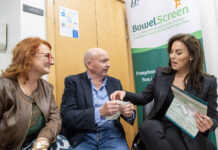
Just over 15 years ago, many of us were still excitedly dialing up our Internet connection and waiting for those pips, bleeps and other agonising noises to come from the desktop. These days, you're probably in the minority if you still have a full-size PC at home.
Technology is at once marvellous and spectacularly frightening. After you reach 25 there's already a million and one things you don't know about what's possible with even basic computer equipment, which most of those younger will be familiar with. The pace of progress is staggering and thankfully, on top of making it easier to play Clash of the Clans, the perpetual march is genuinely improving life in many ways, and there's no greater potential than in the field of healthcare.
The obvious ideal is an Elysium -style gizmo that we lie in and have any ailments – from cancer to coughs – instantly cured. Of course, that's probably a few decades away (and then some), but nevertheless the marriage of tech and health is, in theory, a harmonious one. The more time and money we spend on developing ways in which our creations can help us maintain a clean bill of health, the more this will be possible.
In addition to dividing opinion on whether Google Glass makes people look silly or not, wearable technology is arguable one of the most exciting and visible areas making inroads into the healthcare market. Samsung's recently revealed Simband is a great example of exactly what we're talking about. The device, which is a wristband with digital display, is still in its prototype stage, along with the Sami operating system (Samsung Architecture Multimedia Interactions), and already it poses a pretty exciting prospect.
The gadget is capable of providing a number of readouts to the wearer, informing them of various aspects of their body's functions. Stress levels, sleep pattern, heart rate and blood pressure fall under the wellness category; onset of fatigue, calorie intake and hydration under nutrition; and the activity monitor tells you how many steps you've taken in a given period, the kcal reading of your last workout, and the day's 'on-your-feet-mileage' in distance and hours.
All of which may sound a little over the top, but given Britain's notoriously unhealthy lifestyle, and the difference even just a few changes can make, we'd say devices like this could definitely help people make informed choices on what needs to be altered in order to stay in tip-top condition.
This article was downloaded from http://www.freefeatures.com








